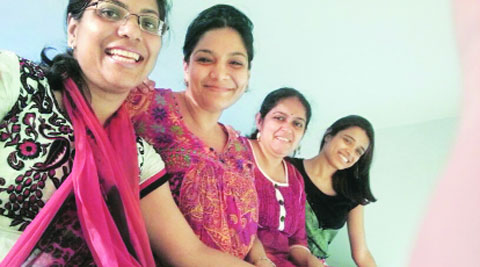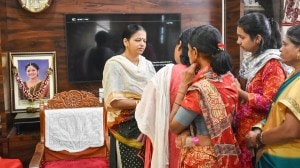- India
- International
The green brigade
Four moms vow for greener, cleaner tomorrow
 The four started the initiative in 2008
The four started the initiative in 2008
For Monisha Narke, Sejal Kshirsagar, Malvika Gadiyar and Smita Shirodkar, the need for a cleaner environment became an agenda, which prompted them to take recycling to households. Four working mothers under the banner RUR — Are you reducing, reusing and recycling — have taken up the mission to tackle environmental concerns at the domestic level.
The initiative, which began in 2008, is now a registered non-profit movement. The group has since been organising awareness programmes at offices, colleges and schools. It also works closely with authorities, sets up collection and compost centres at schools to recycle waste, and conducts research on natural alternatives.
There is tale behind how the group got together. The four working mothers —Narke, Kshirsagar, Gadiyar and Shirodkar — have two children each. Irked over the huge proportions of waste generation and hazardous consumption patterns all around her, Narke prepared a presentation on environmental concerns and showed it to a few mothers, who were waiting to pick up their children from school like her. Following this, Narke along with Kshirsagar and Gadiyar founded RUR. Shirodkar, who is also the founder of Earthoholics (an initiative to promote organic farming) too joined the team later.
RUR has also created a Mind Maps (a flow chart) which tells you how to embark on green programmes, like bringing about small changes in urban lifestyles to lead a greener life. Through RUR, the young mothers have ensured that their collective expertise in engineering, commercial arts, administration and economics has been put to good use.
“Our vision as part of RUR is to create eco-friendly families, which make their waste worthwhile by adopting green practices like vermin compost,” said Narke, founder member of RUR and an Engineering Graduate from the Stanford University, USA.

“At first, I decided to make my own home green,” added Narke. After running from pillar to post to convince civic officials and a few contacts on how to go about recycling, Narke invested Rs 700 on a vermi-compost bin to turn her household waste into manure.
After her successful attempt at recycling waste at her own residence, she decided to form RUR, which has since moved on from green efforts in homes like conserving light and water, recycling garbage to convincing supermarket chain Sahkari Bhandar to promote cloth bags and reduce the use of plastics by 70 per cent “We asked them to give a discount of Re1 on purchases of Rs 200, and a free cloth bag on purchases of over Rs 500. It was a successful initiative until the rule to charge for plastic bag was initiated, following which the offer was discontinued at Sahakari Bhandar,” said Khisrsagar another mother and commercial artist with an masters in applied arts.
RUR collected 2,00,000 tetra packs in 2011 through collection centres in Sahakari Bhandar, schools and colleges across the city. The cartons were recycled at a unit in Palghar and converted into high-grade paper that can be used to make paper products and roofing sheets. 23 desks made of recycled tetrapacks were donated to Kedarnath Vidya Prasarini Marathi School, Chunabhatti, in 2011. Recently, over 20 desks were donated to Valmiki Eco School at Goregaon.
Siddharth Tambde, a class VII student of Kedarnath Vidya Prasarini Marathi School, said, “Recycling is important and I now tell about it to my friends and relatives too. It is fun to plant trees and learn to compost waste at school.”
Nikita Pimpale, principal of Valmiki Eco School, said, “They donated over 20 desks to our school and conducted several environmental activities. Last year in July, they conducted a workshop on plantation where students were taught to make plant saplings on their own, and the technicalities of planting and maintaining them. Students also enjoy such activities and learn about recycling at an early age.”
According to Kshirsagar, it is easier to teach vermi compost to students, than their parents, as most of them do not want to put their hands on waste and garbage. “While some of them try it, others are very reluctant. Hence, starting the initiative at the school level is of great help,” added Kshirsagar.
dipti.sonawala@expressindia.com
Apr 26: Latest News
- 01
- 02
- 03
- 04
- 05








































